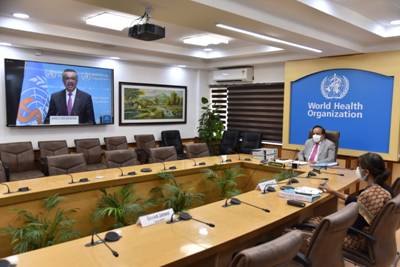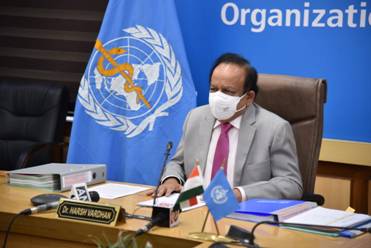Dr Harsh Vardhan, Union Minister for Health and Family Welfare and the Chairman of WHO Executive Board presented details of the 147th and 148th sessions of EB before the 74th World Health Assembly today. Dr Tedros, Director-General of the World Health Organisation briefed about the various activities of WHO including those taken up for COVID management. The Assembly was chaired by Lyonpo Dechen Wangmo, Health Minister of Bhutan.
Speaking on the occasion, Dr Harsh Vardhan summarized the highlights of the 147th and 148th sessions of the Executive Board and its Special Session on COVID-19 response that was held on October 5th and 6th 2020.

Highlighting the achievements of the 148th session, which was held from 18th January to 26th January 2021, Dr Harsh Vardhan noted that the Board called for further efforts to ensure fair and equitable access to COVID-19 vaccines through the COVAX Facility and encouraged WHO to work closely with World Organisation for Animal Health (OIE), and the Food and Agriculture Organisation (FAO) to identify the zoonotic source of the virus.
Dr Harsh Vardhan further said, “The Executive Board stressed that the findings of the three review mechanisms – Independent Panel for Pandemic Preparedness and Response, the Chair of the Review Committee on the Functioning of the International Health Regulations 2005 during COVID-19 Response, and the Chair of the Independent Oversight and Advisory Committee for the WHO Health Emergencies Program- should inform future decision-making and that the Member States needed to play a pivotal role in guiding the Secretariat’s translation of those findings into policy action.”
Dr Harsh Vardhan explained the decisions taken to strengthen the first pillar, which is focused on Universal Health Coverage. He said, “The Board decided to encourage Member States to take further action to address diabetes as a public health problem and recommended that the 74th World Health Assembly should adopt a decision to present an implementation road map for the global action plan for prevention and control of non-communicable diseases during the period 2013 to 2030. The Board also requested the Director-General to draft a global strategy to tackle oral diseases and an action plan for oral public health, as well as recommended that the Health Assembly adopt the global patient safety action plan for the period 2021 to 2030. The Board emphasized the importance of adopting a ‘One Health’ approach following consideration of a report on anti-microbial resistance and welcomed Member State’s participation in the revision of the Codex Code of Practice to Minimize and Contain Foodborne Antimicrobial Resistance.”
Emphasizing Health Emergencies as being the second pillar, Dr Harsh Vardhan stated that the Board engaged in wide-ranging and in-depth discussions on COVID-19 impact on global health. The Board noted various measures taken by the members and underscored the importance of guaranteeing equitable access for all to COVID-19 medicines and vaccines to ensure that they are considered as global public goods. The Board also recommended that the 74th World Health Assembly must consider the report on mental health preparedness and response for the COVID-19 pandemic and endorse the updated comprehensive Mental Health Action Plan for the period of 2013 to 2030.
Dr Harsh Vardhan also informed the forum that “The Board noted the report on the public health implications of implementation of the Nagoya Protocol and acknowledged the need for timely pathogen-sharing to fulfil public health needs, especially during the COVID-19 pandemic. Concerning reports on poliomyelitis eradication, polio transition planning and polio post-certification, the Board expressed concern about the surge in cases of wild poliovirus in Afghanistan and Pakistan, the increasing outbreaks of vaccine-derived poliovirus in several countries, and falling immunization rates as a result of the disruption caused by the COVID-19 pandemic.”

Dr Harsh Vardhan also highlighted the recommendation of the Board to the 74th World Health Assembly, the adoption of a resolution on strengthening efforts to address the social, economic and environmental determinants of health, the recommendations made to the Board in concern to the third pillar, focused on general health and well-being. The Executive Board also noted the reports on the Proposed Programme budget 2022 to 2023 and decided to establish a time-bound and result-oriented Working Group on Sustainable Financing, open to all Member States, during the fourth pillar, which is focused on providing better support to countries. This would enable WHO to have the robust structures and capacities required to fulfil its core functions as defined in the Constitution.
He further stated that to strengthen the governance matters, the Board decided to recommend the adoption of a decision to sunset and streamline reporting requirements on certain resolutions and decisions. It also recommended that the 74th World Health Assembly adopted a decision to welcome the Secretariat’s support of initiatives that celebrate the date of 30th January as a day dedicated to neglected tropical diseases.
Dr Harsh Vardhan said that in concern of global strategies and plans of action that are scheduled to expire within one year, the Board recommended the adoption of a resolution to ensure comprehensive, accessible and affordable access to health systems and care for all persons with disabilities. The Board also requested the Director-General to undertake a broad consultative process to develop global health sector strategies on HIV, viral hepatitis and sexually transmitted infections, for the period 2022 to 2030.
He ended his speech thanking Dr. Tedros and Dr. Poonam Khetrapal Singh, Chairperson, WHO SEARO for their valuable support to his office during the past year.
*****
MV
HFW/HFM 74th and 75th World Health Assembly/24th May 2021/5
(Release ID: 1721383)
Visitor Counter : 7
